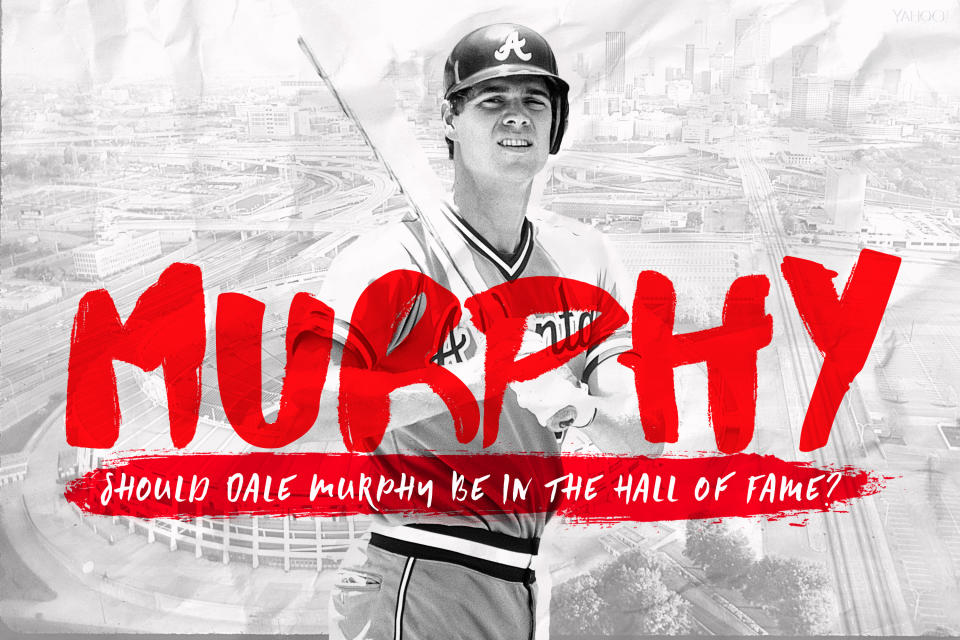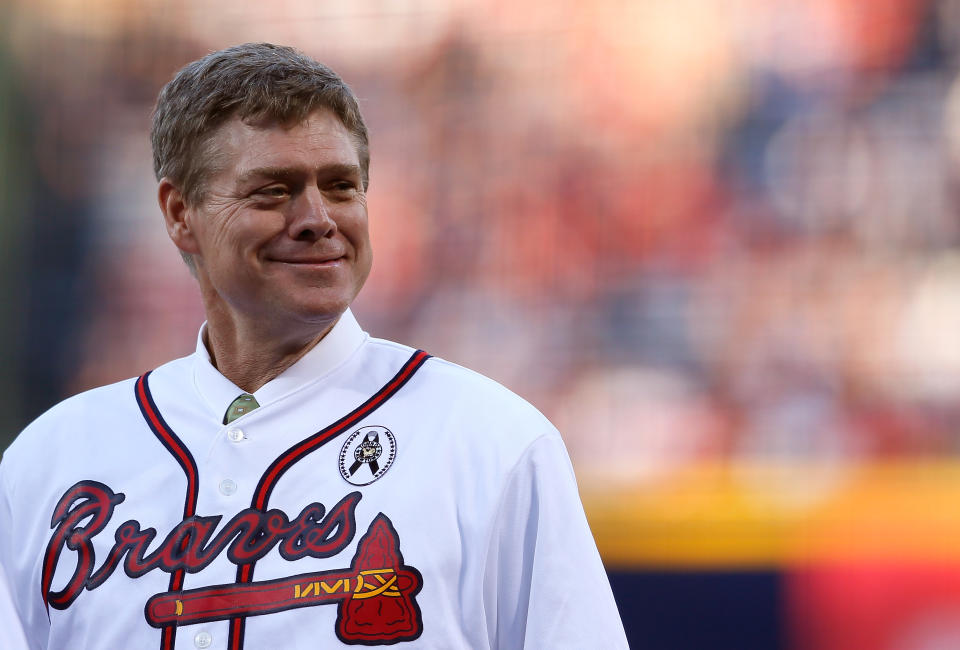Should Dale Murphy be in the Hall of Fame?
Editor’s note: This is the sixth installment of a daily series looking at players on the Modern Era Hall of Fame ballot, which will be voted on Dec. 10. We’ll look at the cases of all 10 people on the ballot and offer our takes on their candidacy.
You might notice this one is a little different. That’s because we asked our resident Braves fan Jay Busbee to write about one of his favorite players. You’ll get a sense of where Jay lands on Murphy early, but The Stew writers will still give their choices at the end.
I can’t be remotely objective about Dale Murphy’s chances for the Hall of Fame. I can’t. My only hope here is that I’m so partisan, that I fanboy so hard for Murph, that I sway you by default, that you concede his value just to make me go away.
Dale Murphy was a genial, gangly, loping fellow with a coiled phone cord of an arm — he played in the ‘80s, remember — and for an equally gangly and loping kid who grew up in Sandy Springs, Georgia, possessed of a similarly flailing arm, well, Murph was pretty much royalty in baby blue. I had a Dale Murphy glove that I couldn’t use nearly as well as he did, I wore Murph’s No. 3 in Little League games long before I’d ever heard of the Dale who sported No. 3 and drove cars, and I’m pretty sure Murphy could hear me every time I bellowed “MUUUUUUURPH!” in the cavernous, fan-free canyons of Atlanta-Fulton County Stadium in the ‘80s.
There’s a famous ‘80s poster — you’ve seen it — of Murph standing in an alleyway, quite possibly the only alley he’s ever visited, holding a bat that glows green like a lightsaber. Termed “Power Alley,” it’s a ridiculous image, as all those glorious ‘80s posters were. But to kids of that era, Murph looked like a damn superhero, a Jedi knight exiled to the baseball hinterlands of Atlanta, the only player on a decade’s worth of teams to throw a scare into the opposition.

Murphy’s career is the baseball equivalent of a Fast and Furious film with just one car chase, sublime but not nearly sustained enough. But for a time, Murphy was as good as baseball got. He played every game for four straight seasons in the ‘80s, compiling two MVP awards, seven All-Star berths, and an armload of Gold Gloves and Silver Slugger honors.
He compiled some of the finest numbers of the 1980s, ranking only behind Schmidt with 308 home runs in the decade and ranking second to Eddie Murray with 929 RBIs (and would have smoked Murray had he played with better teammates, a testament to the flaw in the RBI stat). His career OPS of .815 — a stat that didn’t exist in his day, but we’ll roll with it anyway — isn’t stellar, particularly for a power hitter, ranking 343rd overall … but he’s tied with Hall of Famer and fellow ‘80s icon Barry Larkin, and ahead of a dozen or so other Cooperstown residents.
Alas, Murphy’s career had the trajectory of a warning-track out, rocketing upward on the way out of the infield before dying meekly in a standing outfielder’s glove. Per Baseball Reference, he spent most of the ‘80s compiling numbers roughly comparable for his age to Reggie Jackson, but quickly tailed off into I-remember-that-dude Andruw Jones-Dwight Evans-Joe Carter territory. He ended his career with a fallow .265 average and 398 homers, unable to hit just two taters to get to the then-magic plateau of 400 even playing his final 49 games in Colorado.
You always got the sense Murphy deserved better. There’s an old line about how a wise man plants trees under whose shade he’ll never sit. Murphy toiled away in Atlanta throughout the 80s, ever the genial soldier, pounding organic, artisanal, hormone-free homers even as word spread that the Braves were brewing up something very special down in the farm leagues. In a way, Murphy’s departure signaled the start of a 15-year Braves run of dominance; the team dealt him to the Phillies in August 1990 to make room in right field for a loud, insanely talented minor leaguer named Dave Justice.
The next season, Atlanta went to the World Series, while Murphy barely cracked .250 on yet another sub-.500 team. Four years after that, the kid who replaced Murphy would homer the Braves to a World Series title, while Murphy — by then retired for two years — watched from his couch. Baseball’s a cruel as hell game.
It’s impossible to mount a real defense of Murphy’s Hall of Fame viability without invoking Rule 5, the character clause. Murphy’s a church picnic in human form, possessed of the same guileless innocence in a lumberjack’s body that Tim Tebow would show two decades later. But unlike Tebow, Murphy didn’t play in quite so cynical an era; he wasn’t used as a cudgel to advance (or knock down) agendas. He exhibited faith and decency in a time before those words were politically charged signifiers.
Granted, his beliefs on occasion did put him at angles to prevailing standards. The sharpest knock one can make on Murphy is that he opposed, on religious grounds, the presence of women in locker rooms. But he did so at a time when such a stance got him some mild knock-that-off criticism, not the searing social media hellfire a player would draw if he said anything like that today.
Fundamentally, Murphy was, and is, a genuinely decent dude, a good guy in a profession that could use a few more of those. If the Hall, in the person of Joe Morgan, is now going to stand in its pulpit and thunder against the evils of steroid users, it ought to also sanctify those who played the game, by any definition, The Right Way. On the field, Murphy was a better-than-decent ballplayer. Beyond the field, he was the living, corn-fed, hardworking all-American embodiment of everything baseball wants to believe it is.
Dale Murphy for the Hall of Fame. It’s just a good thing to do.
LAST TIME ON THE BALLOT
Murphy received just 18.6 percent of the vote in 2003, his final season on the Baseball Hall of Fame ballot. He struggled to get much support while eligible, topping out at 23.2 percent in his second year of eligibility. That was the only time he topped 20 percent, though.

PROS
• Two-time MVP in 1982 and 1983, one of only four outfielders to pull off that feat.
• One of the very best players of the 1980s, leading or at the top of the leaderboard in most major power-hitting categories for the entire decade.
• Would singlehandedly offset at least a dozen of the misogynists, racists, scalawags, and scoundrels now in the Hall.
CONS
• Very good for a relatively short period of time; he got hot late and tailed off after only about six good seasons
• Long ball or nothing was the way to go for Murphy, who saw his numbers drop off a cliff once his power left him
• A first-ballot enshrinee in the Hall of Very Good, but Hall of Fame? Really?
COMPARABLE PLAYERS
Similarity scores from Baseball Reference think Andruw Jones and Joe Carter are Murphy’s top comps. Both of those guys were sometimes great players who fit more in the Hall of Very Good. His third most similar player, Duke Snider, is in the Hall of Fame. It took Snider 11 years on the ballot to finally punch his ticket to Cooperstown.
OUR TAKES: SHOULD MURPHY BE IN THE HALL OF FAME?
NO: There’s no denying that Murphy dominated baseball during his four-year peak in the early ’80s. While he was able to sprinkle in a few more elite seasons in there, his drastic drop off during his final six years really hurts. (Chris Cwik)
NO: My heart wants to say yes on Dale Murphy, but I know Cooperstown isn’t about emotion and nostalgia. I remember Murphy as being one of the best of his era, but when you start to look at the line between Hall of Famer and Hall of Very Good, it remains clear that Murphy falls short of the Cooperstown standard, as much of a shame as that feels like. (Mike Oz)
NO: Murphy has advocated for a “bigger” Hall of Fame, and if the Hall was bigger, Murphy would absolutely be in there. But when you stand him up against the greats of even just his own era, he falls short for me. He’s another guy like Don Mattingly: very good overall, but a short peak and a sharp drop-off make it hard to give him my vote. (Liz Roscher)
NO: There’s something to be said for Murphy’s resilience, his willingness to reinvent himself and his determination to play as long as he could. Despite those notable traits, his production leaves him short of this honor. (Mark Townsend)
PREVIOUSLY IN THIS SERIES:
• Steve Garvey
• Tommy John
• Don Mattingly
• Marvin Miller
• Jack Morris
More MLB coverage from Yahoo Sports:
– – – – – – –
Jay Busbee is a writer for Yahoo Sports. Contact him at jay.busbee@yahoo.com or find him on Twitter or on Facebook.


